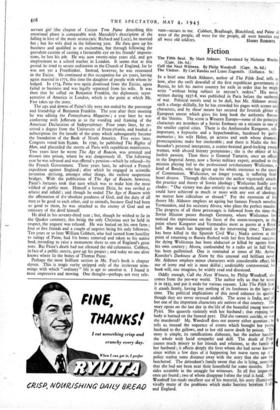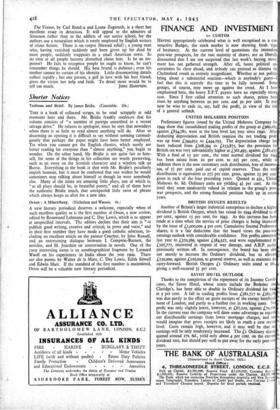Fiction
Call the Next Witness. By Philip Woodruff. (Cape. ,8s. 6do The Visitor. By Carl Randau and Lemke Zugsmith. (Gollancz. 5s.)
IN a brief note Mark Aldanov, author of The Fifth Seal, tells us how, after the swift downfall of the first republican government of Russia, he left his native country for exile in order that he might write " without being subject to anyone's orders." His novel, written during 1937-8, was published in Paris before; the outbreak of war. Political novels tend to be dull, but Mr. Aldanov avoids such a charge skilfully, for he has crowded his pages with scenes and characters, and by these means has secured the feverish glitter of European unrest which gives his long book the authentic flavour of the 'thirties. The scene is. Western Europe—some of the principal characters are members of a Soviet Embassy on a mission to one of the smaller capital cities. There is the Ambassador Kangarov, self- important, a hypocrite and a hypochondriac, burdened by guilty memories ; his wife Helen, an actress and snob whose dramatic preoccupations make her intolerable ; and there is Nadia the Am- bassador's personal interpreter, a scatter-brained good-locking young woman, with absurd literary pretensions ; she is the object of his foolish passion. Then there is General Tamarin, once an officer in the Imperial Army, now a Soviet military expert, attached to the mission playing foil to the professional revolutionary Wislicenus, a kind of Bosola, who has given up his whole existence to the cause of Communism. Wislicenus, no longer young, is suffering from heart disease. Through this character the author vigorously attacks the practice and theory of Soviet ideology ; Wislicenus finally con- cludes : " Our victory was due entirely to our methods, and that we could have achieved as much or more with any sort of ideology, no matter how ridiculous or absurd." For the extension of his theory Mr. Aldanov employs an ageing but famous French novelist, Vermandois, and his secretary Alvera, who plans the perfect murder. The progress of all these personages is followed from the time the Soviet Mission passes through Germany, where Wislicenus has noticed the expressions on the faces of the storm-troopers, to the point where Kangarov and Vermandois meet as guests at a Royal ball. But much has happened in the intervening time: Tamarin has been killed in the Spanish Civil War ; Nadia arrives at the point of returning to Russia flushed with her first fictional success ; the dying Wislicenus has been abducted or killed by agents from his own country ; Alvera, confounded by a radio set in full blast, has been guillotined. One is reminded at times of Mr. Arthur Koestler's Darkness at Noon by this unusual and brilliant novel. Mr. Aldanov employs minor characters with considerable. effect, his
use of irony and wii is _ most skilful; controversial, his book will, one imagines, be widely read and discussed.
Oddly enough, Call the, Next Witness, by Philip Woodruff, also comes from the pre-war world. The author tells us that he wrote it in 5935, and put it aside for various reasons. Like The Fifth Sea), it stands firmly, having lost nothing of its freshness in the lapse of time. The political implications of this novel enhance its quality, though they are never stressed unduly. The scene is India, and all but one of the important character are natives of that country. The story opens on the last day in the lifeof the beautiful young woman, Pyari. She quarrels violently with her husband ; that evening her body is burned on the funeral pyre. Did she commit suicide, or was she murdered? Mg. Woodruff does not answer either question ; he tells us instead the sequence of events which brought her young husband to the gallows, and to her old nurse death by poison. The story is simple, its ramifications elaborate, but the author handles the whole with lucid sympathy and skill. The death of Pyki causes much misery to her friends and relations, to the family of her husband ; it affects deeply the lives whom she had never known, since within a few days of it happening her nurse turns up at police station some distance away with the story that she saw h butchered. The defendant's family swear that she is lying, asserri that she had not been near their household for some months. Both sides scramble in the struggle for witnesses. In all five importan ones are found ; two of whom disappear before the trial is held. .7d• Woodruff has made excellent use of his material, his story ifluminatd vividly many of the problems which make barriers between i at and England. The Visitor, by Carl RancLu and Leane Zugsmith, is a short but excellent essay in detection. It will appeal to the admirers of Simenon rather than to the addicts of our native school, for the authors use a naturalism which is rarely employed by English writers of crime fiction. There is no corpse (blessed relief); a young man who, having vanished suddenly and been given up for dead by most people, suddenly reappears in a small American town. In no time at all people become disturbed about him. Is he an im- postor? He fails to recognise people he ought to know, he can't remember things he should. His best friend is dubious ; even his mother cannot be certain of his identity. Little disconcerting details collect rapidly ; but one person, a girl in love with his best friend, gives the visitor her help and faith. To detail more would be to



























 Previous page
Previous page